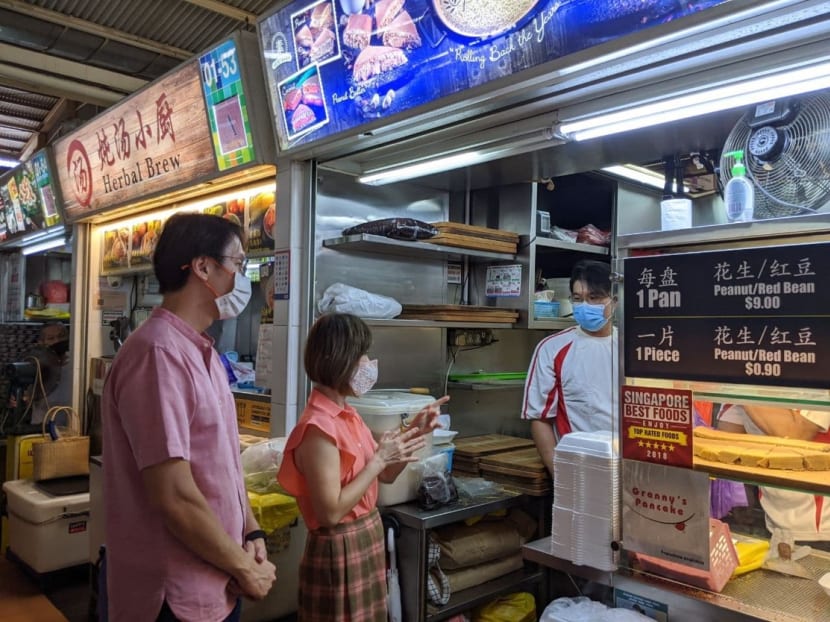NEA to launch new scheme for retiring veteran hawkers to pass on their skills and trade
SINGAPORE — Next year, a new scheme will be rolled out for veteran hawkers who want to retire and wish to pass on their trade but cannot find any suitable successors.

Mr Edward Chia (left), co-chairman of the Workgroup on Sustaining the Hawker Trade, and Dr Amy Khor (centre), Senior Minister of State for Sustainability and the Environment, speaking with Mr Steven Goh, a participant of the Hawkers’ Development Programme.
- The Hawkers Succession Scheme will be piloted in the first quarter of 2021
- Retiring veteran hawkers will be paired with aspiring successors to mentor them and teach them culinary skills
- The scheme is in line with recommendations by the Workgroup on Sustaining the Hawker Trade
- The recommendations were submitted to the Government for review
SINGAPORE — Next year, a new scheme will be rolled out for veteran hawkers who want to retire and wish to pass on their trade but cannot find any suitable successors.
The National Environment Agency (NEA) announced the Hawkers Succession Scheme on Tuesday (Nov 24), in line with recommendations by the Workgroup on Sustaining the Hawker Trade.
Dr Amy Khor, Senior Minister of State for Sustainability and the Environment, said that one of the key challenges identified by the workgroup is the transmission of culinary and business skills from one generation to the next.
Mr Edward Chia, co-chairman of the workgroup and managing director of Timbre Group, said: “With the median age of hawkers at 59 years old, it is important to look at ways to grow the pool of younger hawkers and support new entrants to the trade.”
Retiring veteran hawkers — those with at least 15 years of experience selling food at hawker centres — who are unable to find suitable successors will be paired with aspiring hawkers so that these learners may pick up culinary skills and get some mentorship.
Eligible non-subsidised veteran hawkers who are under this scheme may hand over their stalls to successors who are not family members or relatives.
Right now, only subsidised stallholders are allowed to do so. These are hawkers paying subsidised rent who were relocated from the streets in the early 1970s or allocated stalls under the former Hardship Scheme for hawkers aged 40 and above with dependents to support.
The pilot for the Hawkers Succession Scheme will start in the first quarter of next year. More details will be released at the end of this year.
5 KEY RECOMMENDATIONS
On Tuesday, the workgroup submitted its recommendations to the Ministry of Sustainability and the Environment for consideration.
The workgroup was set up in April last year to help safeguard the hawker culture here and more than half of its 19 members are hawkers, while the rest are advocates of hawker food and relevant stakeholders from academia, as well as the public and private sectors.
The recommendations are aimed at addressing the challenges of sustaining the hawker trade, such as negative public perception, difficulties for new hawkers, and increasing competition in the food and beverage industry.
The ministry and NEA will review the proposals and work closely with the stakeholders of the hawker community to achieve the outcomes.
The recommendations are:
1. Refresh the narrative on hawker trade to attract new entrants
The proposal is to use digital media to change the public’s perception of hawkers and provide resources to encourage the public to celebrate and share hawker culture.
2. Support new and existing hawkers with relevant training programmes
The workgroup suggested having a development programme to help new hawkers enter the trade and existing hawkers improve their skill sets.
Another idea is to collaborate with tertiary and culinary institutions to expose younger generations to hawker culture.
This could be done by incorporating hawker cuisine as a part of the curriculum of educational institutions offering culinary courses. For a start, interested educational institutions may consider working with NEA to identify hawkers who are willing to share their hawker food recipes, which could be taught to students.
Experienced hawkers may also be invited to share their experiences or conduct cooking classes to give students a glimpse of what it takes to be a successful hawker. Interested students could be given attachment or internship opportunities at hawker stalls, subject to the hawkers’ agreement.
3. Alleviate manpower challenges through productivity initiatives and policy review
One way is to broaden the scope of NEA’s Hawkers’ Productivity Grant, which provides funding support for hawkers who want to buy automation equipment, to include tools beyond kitchen automation such as a queue management system to ease manual labour.
4. Celebrate hawker culture and honour hawker legends
Awards may be established to celebrate the achievements of new and experienced hawkers, such as a “Hawker Legend” award, which is to be given to exceptional hawkers.
5. Foster a strong hawkers network and facilitate peer learning among hawkers
To do this, platforms may be created to allow hawker-to-hawker sharing and to develop an online guided journey for aspiring hawkers that provide information on how to become a hawker.
ONGOING EFFORTS TO SAFEGUARD HAWKER TRADE
In January, a three-stage Hawkers’ Development Programme was launched that offers training, apprenticeship and incubation, to facilitate new hawkers’ entry into the trade.
NEA said on Tuesday that close to 150 participants have already completed the training stage of this programme and 50 of them have moved on to the apprenticeship stage.
Among the 50, 35 participants who have completed their apprenticeship are now progressively moving on to the final incubation stage of the programme.
Dr Khor said on Tuesday that the workgroup's recommendations are timely.
Last week, an evaluation body from the United Nations Educational, Scientific and Cultural Organisation (Unesco) evaluated Singapore’s hawker culture as having fulfilled the criteria required for an inscription on the Representative List of the Intangible Cultural Heritage of Humanity.
A decision on whether the hawker culture will be inscribed on Unesco’s list will be announced between Dec 14 and 19.
If hawker culture is successfully inscribed, Singapore will have to show Unesco that there are efforts to safeguard it. It will also join more than 460 others on the list such as yoga in India, Chinese shadow puppetry in China, and the making and sharing of kimchi in North and South Korea.








